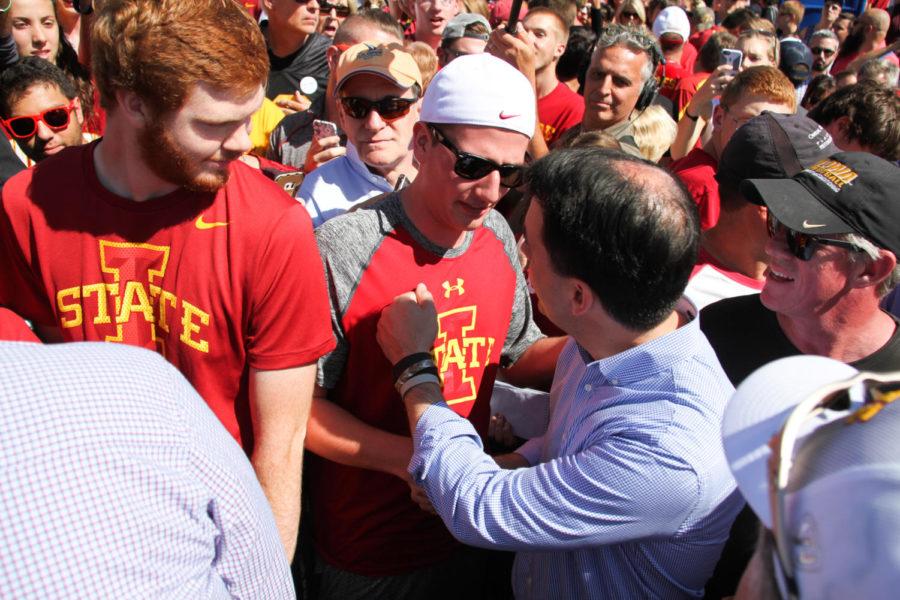Sudden decrease in support leads to Walker’s removal from 2016 race
October 4, 2015
It has been two weeks since Scott Walker — the once-frontrunner in Iowa — unexpectedly dropped out of the Republican presidential contest.
Many were surprised at his early exit, and some wonder how the Wisconsin governor’s support faded so fast.
“Today, I believe that I am being called to lead by helping to clear the field in this race so that a positive conservative message can rise to the top of the field,” Walker said during his campaign suspension announcement Sept. 21.
Please see my statement from earlier tonight on my campaign –> https://t.co/OGhOQgEPyO – SW
— Scott Walker (@ScottWalker) September 22, 2015
“With this in mind, I will suspend my campaign immediately,” he added. “I encourage other Republican presidential candidates to consider doing the same, so that the voters can focus on a limited number of candidates who can offer a positive conservative alternative to the current front-runner.”
These are a few of the final words of Scott Walker’s speech from Madison, Wis. Walker was seen as a sure bet throughout most of his campaign to compete to the end for the Republican nomination.
Since Feb. 25, Walker never wavered below the top three candidates in the national polls until Aug. 18 when Ben Carson took over his third-place position, according to an average of polls from Real Clear Politics.
It was a steep fall from there for Walker, who was informing the nation that he was suspending his campaign a little more than a month after being fixated in the top three of the race with only .5 percent of support in national polls.
Walker’s support in Iowa skyrocketed after he gave a speech in Des Moines in January. He had double-digit poll numbers for months, and at one point, a Quinnipiac poll from mid-February showed him with support from a quarter of likely caucus goers.
Walker also spent a large amount of time in the state early on. His first stop after announcing his campaign in Wisconsin was a rally in Davenport. The plan was to visit all 99 counties while traveling in a Winnebago campaign bus.
He was in the state the day before he announced he would drop out, and also appeared at the Iowa Faith and Freedom Coalition on Sept. 19.
Walker was also one of four candidates to appear at the Cy-Hawk football game, tailgating in the parking lot and watching the game with a general admission ticket.
So did Walker peak in the polls too early?
Steffen Schmidt, professor of political science, seems to think so.
“He did peak too early,” Schmidt said. “He spoke to a group of people real early on who were perfect for him in terms of positions and stuff. It was kind of misleading because the group was really enthusiastic and he shot right up in the polls, but there were still other Republican candidates who had different messages that connected better with a broader base of Republicans.”
Walker’s national poll points dropped from 9.5 percent to just under 4 percent between the first Republican debate, which took place Aug. 6, and the second debate, which took place Sept. 16.
This realization made the second debate located at the Ronald Reagan Presidential Library in Simi Valley, California especially critical for Walker to regain grips on a slipping campaign.
Mack Shelley, professor of political science, said he did not believe Walker took advantage of his crucial second debate.
“He seemed almost lost,” Shelley said. “He wasn’t asked very much directly and he tried to wedge his way in the conversation occasionally but it sounded like he was trying a little bit too hard to make a splash. And in the end, he literally looked like a little guy up against a big boy.”
The big boy was Donald Trump, Shelley said.
Walker finished last in air time by nearly a full minute with 8:29, whereas Trump finished with 18:47 of TV time.
But is the emergence of Donald Trump on the national scene solely responsible for Walker’s unusual plummet in the polls?
Schmidt thinks that presumption is “silly.”
“If Walker was doing really well and Trump came in, then Walker should have dropped from first place to second or third or fourth,” Schmidt said. “But he went from first place in the polls to almost zero to the end. So the question is why would he drop that far? And it was mostly for other reasons other than Trump.”
Walker was not the first candidate to drop out, though. Former Texas Gov. Rick Perry dropped out a few weeks earlier. Even with Walker’s exit, the Republican field remains large with 15 candidates in the race.







